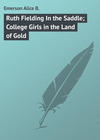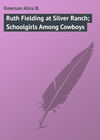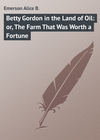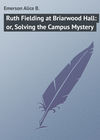Read the book: «Ruth Fielding At Sunrise Farm; What Became of the Raby Orphans», page 6
CHAPTER XIV – “WHY! OF COURSE!”
“I hope you told that Caslon woman, Mother, to keep those brats from boiling over upon our premises,” said Mr. Steele, cheerfully, at dinner that evening, when the story of the day’s adventures was pretty well told.
“Really, John, I had no time. Such a crowd of eels – Well! whatever she may deserve,” said Mrs. Steele, shaking her head, “I am sure she does not deserve the trouble those fresh air children will bring her. And she – she seems like such a nice old lady.”
“Who’s a nice old lady?” demanded her husband, from the other end of the long table, rather sharply.
“Farmer Caslon’s wife.”
“Humph! I don’t know what she is; I know what he is, however. No doubt of that. He’s the most unreasonable – ”
“Well, they’ll have their hands full with all those young ones,” laughed Madge Steele, breaking in upon her father, perhaps because she did not wish him to reveal any further to her guests his ideas upon this topic.
“What under the sun can they do it for?” demanded Lluella Fairfax.
“Just think of troubling one’s self with a parcel of ill-bred children like those orphanage kids,” added Belle Tingley.
“Oh, they do it just to bother the neighbors, of course,” growled Bobbins, who naturally believed all his father said, or thought, to be just right.
“They take a world of trouble on themselves, then, to spite their neighbors,” laughed Mercy Curtis, in her sharp way. “That’s cutting one’s nose off to spite one’s face, sure enough!”
“Goodness only knows why they do it,” began Madge, when Ruth, who could keep in no longer, now the topic had become generally discussed among the young people, exclaimed:
“Both the farmer and his wife look to be very kindly and jolly sort of people. I am sure they have no idea of troubling other folk with the children they take to board. They must be, I think, very charitable, as well as very fond of children.”
“Trust Ruth for seeing the best side of it,” laughed Heavy.
“And the right side, too, I bet,” murmured Tom Cameron.
“We’ll hope so,” said Mr. Steele, rather grimly. “But if Caslon lets them trespass on my land, he’ll hear about it, sharp and plenty!”
Now, it so happened, that not twenty-four hours had passed before the presence of the “fresh air kids” was felt upon the sacred premises of Sunrise Farm. It was very hot that next day, and the girls remained in the shade, or played a desultory game of tennis, or two, or knocked the croquet balls around a bit, refusing to go tramping through the woods with the boys to a pond where it was said the fish would bite.
“So do the mosquitoes – I know them,” said Mercy Curtis, when the boys started. “Be honest about it, now; I bet you get ten mosquito bites to every fish-bite. Tell us when you get back.”
Late in the afternoon the rural mail carrier was due and Ruth, Helen, Madge and Heavy started for the gate on the main road where the Steeles had their letter box.
A little woolly dog ran after Madge – her mother’s pet. “Come on, Toodles!” she said, and then all four girls started to race with Toodles down to the gate.
Suddenly Toodles spied something more entertaining to bark at and caper about than the girls’ skirts. A cat was slipping through the bushes beside the wall, evidently on the trail of some unconscious bird. Toodles, uttering a glad “yap, yap, yap!” started for the cat.
Two tousled, curly heads appeared at the gateway. Below the uncapped heads were two thin bodies just of a size, clothed in shirts and overalls of blue.
“Hello, kiddies!” said Heavy. “How did you get here?”
“On our feet – didn’t we, Dickie?” responded Master Willie.
“Yep,” said Dickie.
“Oh, dear me! Toodles will hurt that cat!” cried Madge. “One of you boys run and save her – save kitty!” she begged.
But as the youngsters started off as per direction, the cat turned savagely upon Toodles. She snarled like a wildcat, leaped for his fur-covered back, and laid in with her claws in a way that made the pup yell with fright and pain.
“Oh, never mind the cat! Help Toodles! Help Toodles!” wailed Madge, seeing her pet in such dire trouble.
The youngsters stopped with disgust, as Toodles went kiting up the hill, yelping.
“Pshaw!” exclaimed Willie. “Toodles don’t need helpin’. Did’ye ever see such a dog? What he needs is a nurse – don’t he, Dickie?”
“Yep,” declared the oracular Dickie, with emphasis.
Heavy dropped down on the grass and rolled. As the cat had quickly returned from the chase, Madge and Helen joined her. It was too funny. The “terrible twins” were just slipping out of the gate, when Ruth called to them.
“Don’t go yet, boys. Are you having a good time?”
“We ain’t allowed in here,” said Willie.
“Who told you so?”
“The short, fat man with the squinty eyes and the cane,” declared Willie, in a matter of fact way.
“Short – fat – squinty – My goodness! I wonder if he can mean my father?” exclaimed Madge, inclined to be offended.
“But you can stand there and talk with us,” said Ruth, strolling toward the boys. “So you are having a nice time at Mr. Caslon’s?”
“Bully – ain’t we, Dickie?”
“Yep,” agreed the echo.
“And you won’t be glad to go back to the orphanage when you have to leave here?”
“Say, who ever was glad to go to a ’sylum?” demanded Willie, with scorn.
“And you can’t remember any other home, either of you?” asked Ruth, with pity.
“Huh! we ’member just the same things. Our ages is just alike, they be,” said Willie, with scorn.
“They have you there, Ruth,” chuckled Heavy.
Ruth Fielding was really interested in the two youngsters. “And you are all alone in the world?” she pursued.
“Nope. We gotter sister.”
“Oh! so you said.”
“And it’s so, too. She used ter be at the ’sylum,” explained Willie. “But they sent her off to live with somebody. And we was tried out by a lady and a gentleman, too; but we was too much work for the lady. We made too much extry washin’,” said Willie, solemnly.
“My goodness me!” exclaimed Ruth, suddenly. “What are your names?”
“I’m Willie; he’s Dickie.”
“But Willie and Dickie what?” demanded the startled Ruth.
“No, ma’am. It ain’t that. It’s Raby,” declared the youngster, coolly. “And our sister, she’s Sadie Raby. She’s awful smart and some day, she told us, she’s goin’ to come an’ steal us from the ‘sylum, and then we’ll all live together and keep house.”
“Will you hear this, Helen?” demanded Ruth, eagerly, to her chum who had run to her.
“Why, of course! we might have known as much, if we had been smart. These are the twins Sadie told you about. And we never guessed!”
CHAPTER XV – THE TEMPEST
Ruth was much interested in the fresh air children, and so was Helen. They found time to walk down to the Caslon farm and become acquainted with the entire twelve. Naturally, the “terrible twins” held their attention more than the others, for it did seem so strange that the little brothers of Sadie Raby should come across Ruth’s path in just this way.
Of course, in getting so well acquainted with the children, Ruth and her chum were bound to know the farmer and his wife better. They were very plain, “homey” sort of people, just as Ruth had guessed, and it appeared that they were not blessed with an over-abundance of ready money. Few farmers in Mr. Caslon’s circumstances are.
What means they had, they joyfully divided with the youngsters they had taken to board. The Caslons had no living children; indeed, the two they had had, years ago, died while they were yet babies. This Mrs. Caslon confided to Ruth.
“It left an empty place in our hearts,” she said, softly, “that nothing but other little children can fill. John has missed them fully as much as I have. Yes; he lets these little harum-scarums pull him around, and climb all over him, and interfere with his work, and take up his time a good deal. Yes, I know the place looks a sight, inside the house and out, when they go away.
“But for a few weeks every year we have a host of young things about us, and it keeps our hearts young. The bother of ’em, and the trouble of ’em, is nothing to the good they do us both. Ah, yes!
“Yes, I’ve often thought of keeping one or two of them for good. There’s a-many pretty ones, or cunning ones, we’d like to have had. But then – think of the disappointment of the rest of the darlings!
“And it would have narrowed down our sympathy – mine and John’s,” proceeded Mrs. Caslon, shaking her head gently. “We’d have centered all our love and longin’ into them we took for keeps, just as we centered all our interest in the two little ones God lent us for a little while, long ago.
“Havin’ a number of ’em each year, and almost always different ones, has been better, I guess – better for all hands. It keeps John and me interested more, and we try to make them so happy here that each poor, unfortunate orphan will go away and remember his or her summer here for the rest of their lives.
“And they do have so little to be happy over, these orphans – and it takes so very little to make them happy.
“If I had money – much money,” continued the farmer’s wife, clasping her hands, fervently, “I’d move many orphan asylums, and such like, out of the close, hot cities, where the little ones are cramped for room and air, and put each of them on a farm – a great, big farm. City’s no place for children to grow up – ’specially those that have no fathers and mothers.
“You can’t tell me but that these young ones miss their parents less here on this farm than they do back in the brick building they live in most of the year,” concluded the good woman, earnestly.
Ruth quite fell in love with the old lady – who did not appear so very old, after all. Perhaps she had kept her heart young in serving these “fresh air” orphans, year after year. And Mr. Caslon seemed a very happy, jolly sort of man, too.
The two girls stole away quite frequently to watch the youngsters play, or to teach them new means of entertaining themselves, or to talk with the farmer’s wife. But they did not wish the other girls, and the Steeles, to know where they went on these occasions.
Their host, who was the nicest kind of a man in every other way, seemed determined to look upon Caslon as his enemy; and Mr. Steele was ready to do anything he could to oust the old couple from their home.
“Pshaw! a man like Caslon can make a good living anywhere,” Mr. Steele declared. “His crops just grow for him. He’s an A-1 farmer – I’d like to find as good a one before next year, to superintend my whole place. He’s just holding out for a big price for his farm, that’s all he’s doing. These hayseeds are money-mad, anyway. I haven’t offered him enough for his old farm, that’s all.”
Ruth doubted if this were true. The Caslon place was one of the oldest homesteads in that part of the State, and the house had been built by a Caslon. Mr. Steele could not appreciate the fact that there was a sentiment attached to the farmer’s occupancy of his old home.
The Caslons had taken root here on this side-hill. The farmer and his wife were the last of the name; they had nobody to will it to. But they loved every acre of the farm, and the city man’s money did not look good enough to them.
Ruth Fielding hungered to straighten out the tangle. She wished she might make Mr. Steele understand the old farmer’s attitude. Was there not, too, some way of settling the controversy in a way satisfactory to both parties?
Meanwhile the merry party of young folk at Sunrise Farm was busy every waking hour. There were picnics, and fishing parties, and games, and walks, and of course riding galore, for Mr. Steele had plenty of horses.
Ruth and Helen privately worked up some interest among the girls and boys visiting the farm, in a celebration on the Fourth for the fresh air children. Ruth had learned that the farmer had purchased some cheap fireworks and the like for the entertainment of the orphans; but Ruth and her chum wanted to add to his modest preparations.
Ten dollars was raised, and Tom Cameron took charge of the fund. He was to ride into town the afternoon before the Fourth to make the purchases, but just about as he was to start, a thunderstorm came up.
Mr. Steele, who was a nervous man, forbade any riding or driving with that threatening cloud advancing over the hills. The lightning played sharply along the edges of the cloud and the thunder rolled ominously.
“You youngsters don’t know what a tempest is like here in the hills,” said Mr. Steele. “Into the house – all of you. Take that horse and cart back to the stables, Jackson. If Tom wants to go to town, he’ll have to wait until the shower is over – or go to-morrow.”
“All right, sir,” agreed young Cameron, cheerfully. “Just as you say.”
“Are all those girls inside?” sharply demanded Mr. Steele. “I thought I saw the flutter of a petticoat in the shrubbery yonder.”
“I’ll see,” said Tom, running indoors.
Nervous Mr. Steele thought he saw somebody there behind the bushes, before he heard from Tom. It had already begun to rain in big drops, and suddenly there was a flash of lightning and a report seemingly right overhead.
The host turned up his coat collar, thrust his cap over his ears, and ran out across the lawn toward the path behind the shrubbery. It led to a summer house on the side lawn, but this was a frail shelter from such a tempest as this that was breaking over the hill.
Mr. Steele saw the flutter of a skirt ahead, and dashed along the path, the rain pelting him as he ran.
“Come back here! Come to the house, you foolish girl!” he cried, and popped into the summer house just as the clouds seemed to open above and the rain descend in a flood.
It was so dark, and Mr. Steele was so blinded for a moment, that he could scarcely see the figure of whom he was in search. Then he beheld a girl crouching in a corner, with her hands over her ears to shut out the roar of the thunder and her eyes tightly closed to shut out the lightning.
“For mercy’s sake! get up and come into the house. This place will be all a-flood in a minute,” he gasped.
Suddenly, as he dragged the girl to her feet by one shoulder, he saw that she was not one of the house party at all. She was a frail, shrinking girl, in very dirty clothing, and her face and hands were scratched and dirty, too. A regular ragamuffin she appeared.
“Why – why, where did you come from?” demanded Mr. Steele.
The girl only stuttered and stammered, looking at him fearfully.
“Come on! never mind who you are,” he sputtered. “This is no place for you in this tempest. Come into the house!”
He set out on a run again for the front veranda, dragging her after him. The girl did not cry, although she was certainly badly frightened by the storm.
They reached the door of the big house, saturated. Here Mr. Steele turned to her again.
“Who are you? What are you doing around here, anyway?” he demanded.
“Ain’t – ain’t this the place where they got a bunch of fresh air kids?” asked the girl.
“What?” gasped Mr. Steele. “I should say not! Are you one of those young ones Caslon has taken to board to the annoyance of the whole neighborhood? Ha! what were you doing trespassing on my land?”
“I ain’t neither!” returned the girl, pulling away her hand. “You lemme be.”
“I forbade any of you to come up here – ”
“I ain’t neither,” reiterated the girl. “An’ I don’t know what you mean. I jest got there. And I’m lookin’ for the place where the fresh air kids stay.”
In the midst of this the door was drawn open and Mrs. Steele and some of the girls appeared.
“Do come in, Father,” she cried. “Why! you’re soaking wet. And that child! bring her in, whoever she is. Oh!”
Another flash of lightning made them all cower – all but Ruth Fielding, who had crept forward to look over Mrs. Steele’s shoulder. Now she dashed out and seized the bedrabbled looking stranger by the hand.
“Why, Sadie Raby! who’d ever expect to see you here? Come in! do let her come in out of the storm, Mrs. Steele. I know who she is,” begged Ruth.
CHAPTER XVI – THE RUNAWAY
Madge said, in something like perplexity: “You do pick up the strangest acquaintances, Ruth Fielding. She really does, Ma. But that has always been Ruth’s way.”
Mrs. Steele was first disturbed over her husband’s condition. “Go right away and change into dry garments – do, Father,” she urged. “You will get your death of cold standing there. And shut the door. Oh! that lightning!”
They had to wait for the thunder to roll away before they could hear her again, although Mr. Steele hurried upstairs without another glance at the bedrabbled child he had brought in out of the storm.
“This – this girl must go somewhere and dry herself,” hesitated Mrs. Steele, when next she spoke. “My! isn’t she a sight? Call one of the maids, someone – ”
“Oh, dear Mrs. Steele!” exclaimed Ruth, eagerly, “let me take Sadie upstairs and look after her. I am sure I have something she can put on.”
“So have I, if you haven’t,” interposed Helen. “And my clothes will come nearer fitting her than Ruth’s. Ruth is getting almost as fat as Heavy!”
“There is no need of either of you sacrificing your clothes,” said Mrs. Steele, slowly. “Of course, I have plenty of outgrown garments of my own daughters’ put away. Yes. You take care of her if you wish, Ruth, and I will hunt out the things.”
Here the strange girl interposed. She had been darting quick, shrewd glances about the hall at the girls and boys there gathered, and now she said:
“Ye don’t hafter do nothing for me. A little rainwater won’t hurt me – I ain’t neither sugar nor salt. All I wants to know is where them fresh air kids is stayin’. I ain’t afraid of the rain – it’s the thunder and lightning that scares me.”
“Goodness knows,” laughed Madge, “I guess the water wouldn’t hurt you. But we’ll fix you up a little better, I guess.”
“Let Ruth do it,” said Mrs. Steele, sharply. “She says she knows the girl.”
“She’s a friend of mine,” said the girl of the Red Mill, frankly. “You surely remember me, Sadie Raby?”
“Oh, I remember ye, Miss,” returned the runaway. “You was kind to me, too.”
“Come on, then,” said Ruth, briskly. “I’m only going to be kind to you again – and so is Mrs. Steele going to be kind. Come on!”
An hour later an entirely different looking girl appeared with Ruth in the big room at the top of the house which the visiting girls occupied. Some of them had come upstairs, for the tempest was over now, and were making ready for dinner by slow stages, it still being some time off, and there was nothing else to do.
“This is Sadie Raby, girls,” explained Ruth, quietly. “She is the sister of those cute little twins that are staying at the Caslons’ place. She has had a hard time getting here, and because she hasn’t seen Willie and Dickie for eight months, or more, she is very anxious to see them. They are all she has in the world.”
“And I reckon they’re a handful,” laughed Heavy. “Come on! tell us all about it, Sadie.”
It was because of the “terrible twins” that Ruth had gotten Sadie to talk at all. The girl, since leaving “them Perkinses,” near Briarwood, had had a most distressful time in many ways, and she was reticent about her adventures.
But she warmed toward Ruth and the others when she found that they really were sincerely interested in her trials, and were, likewise, interested in the twins.
“Them kids must ha’ growed lots since I seen ’em,” she said, wistfully. “I wrote a letter to a girl that works right near the orphanage. She wrote back that the twins was coming out here for a while. So I throwed up my job at Campton and hiked over here.”
“Dear me! all that way?” cried Helen, pityingly.
“I walked farther than that after I left them Perkinses,” declared Sadie, promptly. “I walked clean from Lumberton to Cheslow – followed the railroad most of the way. Then I struck off through the fields and went to a mill on the river, and worked there for a week, for an old lady. She was nice – ”
“I guess she is!” cried Ruth, quickly. “Didn’t you know that was my home you went to? And you worked for Aunt Alvirah and Uncle Jabez.”
No, Sadie had not known that. The little old woman had spoken of there being a girl at the Red Mill sometimes, but Sadie had not suspected the identity of that girl.
“And then, when you were still near Cheslow, my brother Tom, and his dog, rescued you from the tramps,” cried Helen.
“Was that your brother, Miss?” responded Sadie. “Well! he’s a nice feller. He got me a ride clear to Campton. I’ve been workin’ there and earnin’ my board and keep. But I couldn’t save much, and it’s all gone now.”
“But what do you really expect to do here?” asked Madge Steele, curiously.
“I gotter see them kids,” declared Sadie, doggedly. “Seems to me, sometimes, as though something would bust right inside of me here,” and she clutched her dress at its bosom, “if I don’t see Willie and Dickie. I thought this big house was likely where the fresh airs was.”
“I should say not!” murmured Madge.
“They’re all right – don’t you be afraid,” said Ruth, softly.
“I thought mebbe the folks that was keepin’ the kids would let me work for them,” said Sadie, presently. “For kids is a lot of trouble, and I’m used to ’em. The matron at the home said I had a way with young’uns.”
She told them a good deal more about her adventures within the next half hour, but Madge had left the room just after making her last speech. While the girls were still listening to the runaway, a maid rapped at the door.
“Mr. Steele will see this – this strange girl in the library,” announced the servant.
Sadie looked a little scared for a moment, and glanced wildly around the big room for some way of escape.
“Gee! I ain’t got to talk with that man, have I?” she whispered.
“He won’t bite you,” laughed Heavy.
“He’s just as kind as kind can be,” declared Helen.
“I’ll go down with you,” said Ruth, decisively. “You have plenty of friends now, Sadie. You mustn’t be expecting to run away all the time.”
Sadie Raby went with Ruth doubtfully. The latter was somewhat disturbed herself when she saw Mr. Steele’s serious visage.
“You’ll excuse me, Mr. Steele?” suggested Ruth, timidly. “But she is all alone – and I thought it would encourage her to have me here – ”
“That is like your kind heart, Ruth,” said the gentleman, nodding. “I don’t mind. Madge has told me her story. It seems that the child is rather wild – er – flighty, as it were. I suppose she wants to run away from us, too?”
“I ain’t figurin’ to stay here,” said Sadie, doggedly. “I’m obleeged to you, but this ain’t the house I was aimin’ for.”
“Humph! no. But I am not sure at all that you would be in good hands down there at Caslon’s.”
Ruth was sorry to hear him say this. But Sadie broke in with: “I don’t keer how they treat me as long as I’m with my brothers. And they are down there, this Ruth girl says.”
“Yes. I quite understand that. But we all have our duty to perform in this world,” said Mr. Steele, gravely. “I wonder that you have fallen in with nobody before who has seen the enormity of letting you run wild throughout the country. It is preposterous – wrong – impossible! I never heard of the like before – a child of your age tramping in the open.”
“I didn’t do no harm,” began Sadie, half fearful of him again.
“Of course it is not your fault,” said Mr. Steele, quickly. “But you were put in the hands of people who are responsible to the institution you came from for their treatment of you – ”
“Them Perkinses?” exclaimed Sadie, fearfully. “I won’t never go back to them – not while I’m alive I won’t! I don’t care! I jest won’t!”
She spoke wildly. She turned to run from the room and would have done so, had not Ruth been there to stop her and hold her in her arms.



















